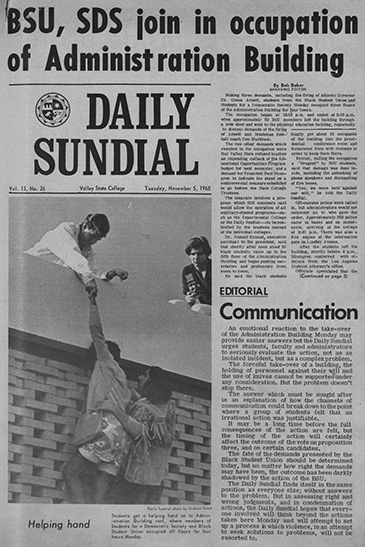Newsletter Edition: Fall 2021
Contributed by David Morck
Since the days when CSUN was known as San Fernando Valley State College, the campus has been the birthplace of political movements and protest pushing toward a culture of inclusiveness and social justice for students, staff and faculty. One early flashpoint in the struggle for racial equity at CSUN has come to be known as the "November 4th Incident." Its aftermath led to the creation of new cultural studies departments, and in more recent days, to the renaming of the Oviatt Library to the University Library.
The crisis arose following a physical confrontation between an African-American football player and the Freshman Football Coach, who was white. Students from the Black Student Union (BSU) met with the Athletics Director Glenn Arnett and demanded that the coach, Don Markham, be fired. On November 4th, BSU students entered the administration building (now Bayramian Hall) and proceeded to the University President's Office to further their demands. What resulted was a four-hour "takeover" of three floors of the administration building, while the students met with Arnett, acting campus president Paul Blomgren, Delmar Oviatt, and others. While the discussions culminated in an agreement between Blomgren and BSU representatives that included educational reforms, the administrators were shaken and pressed for the prosecution of several of the student protestors.
The Campus Unrest Process Committee Recordings Collection consists of eight audio recordings of negotiations between students and campus administration, with input from community members, following the events of the Black Student Union (BSU) takeover of the Administration Building on November 4, 1968. The collection has been digitized and is available as part of CSUN Digital Collections. Among topics discussed are amnesty for CSUN student protestors and the creation of the first ethnic studies programs on campus, then called Afro-American Studies (now Africana Studies) and Mexican-American Studies (now Chicana/o Studies). We spoke with April Feldman, Project Archivist for the University Library's Special Collections & Archives about the curation of the Campus Unrest Process Committee Recordings Collection.
Q: Have these recordings always been part of the University Archives? If not, what precipitated their acquisition, and who or what authority stored them before the Library received them?
April: Records indicate the tapes were donated to the archives by William Huling from CSUN Counseling Services and Gene Soyster from the CSUN Dept. of Education in 1988. Past standard practices in the archives lead me to believe the tapes were donated to the Urban Archives Center first and subsequently transferred to University Archives and Campus History collections in 2014.

Q: What challenges did you face getting them digitized and making them available to the public? Were there any political difficulties?
April: There were no political difficulties in getting them digitized - quite the opposite, actually.
Faculty/staff time and other resources are always at a premium when planning projects and setting priorities, especially when coordinating multiple units within the library. The impetus for digitization and public access came while the Oviatt Library Advisory Working Group, formed by the university president and headed by the provost, was in their research phase. Since we were processing the materials to give the working group access, we decided to take the extra steps to make them accessible to the public at that time as well.
Q: What big personalities stand out to you in these discussions?
April: 1968-1969, when the political tensions on campus were at their height, we see several names appear regularly. These include Delmar Oviatt, former Dean of Students, VP of Academic Affairs, and interim President; Stan Charnofsky, the first head of the SFVSC EOP; Archie Chapman, first president of the BSU; Bill Burwell, founding member of the BSU and first director of the then Afro-American Studies department.
Q; When you were processing this acquisition, what did you learn about CSUN administrative procedures that you didn't know before?
April: Not too much to be honest. I believe I learned more about social mores and the ethnic climate of the San Fernando Valley in the 1960s.
Q: What do you think people who listen to these recordings will be surprised to learn about the political change at CSUN in the late 1960s?
April: How little things have actually changed. While there are significantly more BIPOC students, faculty, and staff on campus the conversations we’re having are still the same 50+ years later.
I don't think most people realize how politically active students on this campus were (and often are), especially in the 1960s. I know it surprised me the first time I heard about it. And sometimes they faced serious consequences. According to the Report of the Oviatt Library Working Advisory Group (2020), "Of the students arrested between November 1968 and January 1969, 20 were convicted of felonies, with three sentenced to serve 1-25 years in state prison. Eight other students were placed on probation for five years, and sentenced to 1-12 months in county jail." The University Archives contains many documents and images that bear witness to the repeated conflict between student protestors and campus authorities. One of the most striking is a photo documenting a clash between demonstrators and police in January of 1969.
Q: How do you think scholars, students or the public will use these recordings, now that they're available?
April: That's always difficult to predict. There are so many ways to approach research. For instance, I come from a background in history and therefore tend to think about it in those terms.
One could use the recordings for traditional historiography. Someone else could be researching the history of race relations. Another could be more interested in social mores, the negotiation process, or the presence of women in the movement or the negotiation process. Those are just a couple of research questions off the top of my head. I'm sure there would be a lot more coming from different perspectives and disciplines.
More resources:
- Report of the Oviatt Library Working Advisory Group (pdf), 2020. The advisory group met to consider the renaming of the Oviatt Library to University Library. The bibliography at the end of this document has a long list of other resources that can help with a further understanding of what spurred the "November 4th Incident" protests and occupation of the Administration Building, as well as details on the justification for removing Delmar T. Oviatt from the Library's name.
- Browse the Campus Unrest Committee Recordings Collection on Digital Collections
- Explore the Founding Africana and Chicana/o Studies at CSUN digital timeline, which includes links to coverage of the November 4th Incident by the Daily Sundial.
